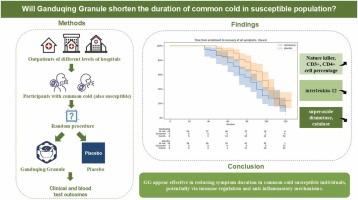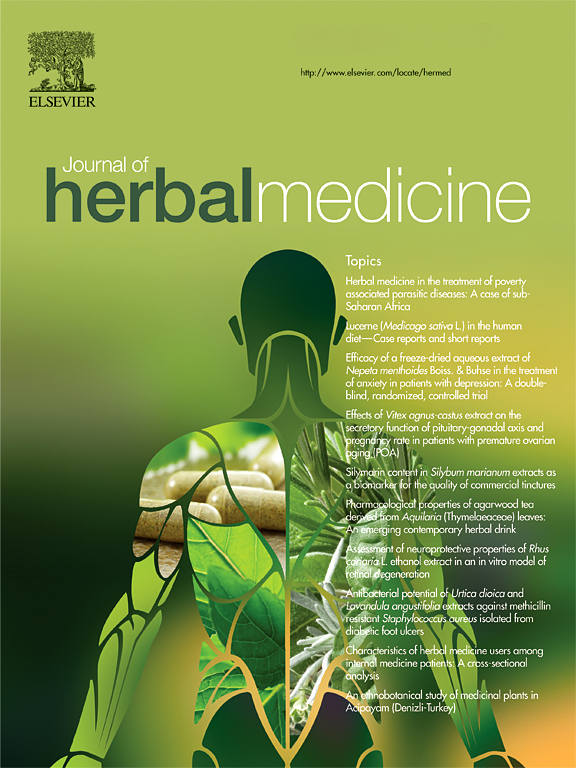Ganduqing Granules for Treatment of the Common Cold: A Randomised Controlled Trial
IF 1.9
4区 医学
Q2 INTEGRATIVE & COMPLEMENTARY MEDICINE
引用次数: 0
Abstract
Introduction
The common cold poses significant health concerns, particularly for individuals with weakened immune systems. This study evaluates the efficacy and safety of Ganduqing granules (GG), a proprietary Chinese medicine, in treating cold symptoms among susceptible population.
Methods
Participants aged 18–70, who experienced more than four colds annually, with symptom onset within 48 hours, and who had received no prior treatment were included. They were randomly assigned to GG group or placebo group and were evaluated at baseline and follow-up. The participants and investigators were double-blinded. The primary outcome was the overall symptom recovery time. Other outcomes included individual symptom recovery, clinical remission rates, immune cell percentages, cytokine levels, and oxidative stress markers.
Results
A total of 120 participants were enroled and evenly divided into two groups. The full analysis set included 118 participants, and the per protocol set included 108 participants. The mean time to overall symptom recovery in the Ganduqing group (60 cases) was 84.93 ± 25.95 hours, and that in the placebo group (58 cases) was 96.19 ± 20.50 hours; the former was significantly shorter than the latter by 11.26 hours (95% CI: −19.69 to −2.84, P = 0.009). By day three, the GG group showed markedly higher recovery rates compared to the control group, with a relative risk of 2.11 (95% CI: 1.14–3.90). Immune cells and cytokine analyses suggested immunomodulatory effects.
Conclusions
GG effectively shortens the duration of cold symptoms, possibly by modulating the immune system and reducing inflammation.

肝毒清颗粒治疗普通感冒的随机对照试验
普通感冒引起严重的健康问题,特别是对免疫系统较弱的人。本研究评价中药甘毒清颗粒治疗感冒易感人群感冒症状的疗效和安全性。研究对象年龄在18-70岁之间,每年感冒4次以上,在48 小时内出现症状,且未接受过任何治疗。随机分为GG组和安慰剂组,分别在基线和随访时进行评估。参与者和调查人员是双盲的。主要观察指标为总体症状恢复时间。其他结果包括个体症状恢复、临床缓解率、免疫细胞百分比、细胞因子水平和氧化应激标志物。结果共入组120人,平均分为两组。完整的分析集包括118名参与者,每个方案集包括108名参与者。甘度清组(60例)平均症状恢复时间为84.93 ± 25.95 小时,安慰剂组(58例)平均症状恢复时间为96.19 ± 20.50 小时;前者明显短于后者11.26 小时(95% CI:−19.69 ~−2.84,P = 0.009)。到第三天,GG组的恢复率明显高于对照组,相对危险度为2.11 (95% CI: 1.14-3.90)。免疫细胞和细胞因子分析提示免疫调节作用。结论甘露可有效缩短感冒症状持续时间,可能与调节免疫系统、减轻炎症有关。
本文章由计算机程序翻译,如有差异,请以英文原文为准。
求助全文
约1分钟内获得全文
求助全文
来源期刊

Journal of Herbal Medicine
INTEGRATIVE & COMPLEMENTARY MEDICINE-
CiteScore
3.90
自引率
0.00%
发文量
94
期刊介绍:
The Journal of Herbal Medicine, the official journal of the National Institute of Medical Herbalists, is a peer reviewed journal which aims to serve its readers as an authoritative resource on the profession and practice of herbal medicine. The content areas of the journal reflect the interests of Medical Herbalists and other health professionals interested in the clinical and professional application of botanical medicines. The objective is to strengthen the research and educational base of herbal medicine with research papers in the form of case studies, original research articles and reviews, monographs, clinical trials and relevant in vitro studies. It also publishes policy statements, opinion pieces, book reviews, conference proceedings and profession related information such as pharmacovigilance reports providing an information source for not only the Herbal Practitioner but any Health professional with an interest in phytotherapy.
 求助内容:
求助内容: 应助结果提醒方式:
应助结果提醒方式:


